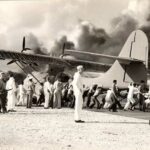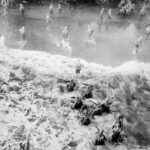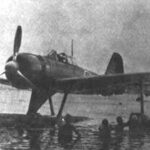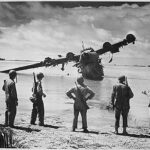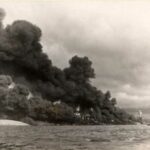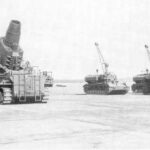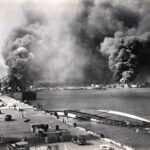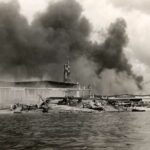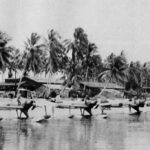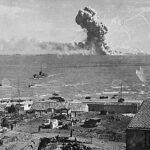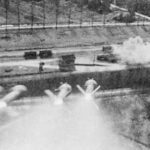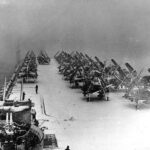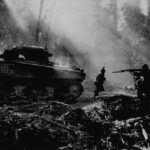Turkish foreign policy recently intensified its attention on the Arab Spring, carrying out extensive diplomatic efforts to secure an immediate resolution for the turmoil in the region. (more…)
Category: Authors
-

Turkey Recalibres Its Policy On Libya
Turkey Recalibres Its Policy On Libya
Publication: Eurasia Daily Monitor Volume: 8 Issue: 139
July 20, 2011
By: Saban Kardas
Turkey has hosted an important meeting, which marked the drastic transformation its policy on Libya has undergone. Although Turkey initially expressed strong opposition to military intervention against the Gaddafi regime, over time it adjusted its policy and managed to coordinate it with Western powers and various Muslim nations that have been working to end Gaddafi’s rule. The Libya Contact Group, bringing together these powers, held its fourth meeting in Istanbul, co-chaired by Turkey and the UAE, on July 15.
Predating the meeting, Turkey had undertaken several steps to forge closer ties with the Libyan rebels. Despite its opposition to the use of force, Ankara later agreed to the transfer of the operation to NATO command and joined the Libya Contact Group. However, Turkey’s insistence on a negotiated settlement, and its slow pace in cutting its ties with Tripoli arguably drew a wedge between Ankara and Tripoli-based National Transitional Council (NTC) (EDM, April 19).
While distancing itself from Gaddafi, Turkey progressively repaired its ties with the NTC. After joining the Contact Group, Turkey intensified its criticism against the Gaddafi administration. Prime Minister Recep Tayyip Erdogan argued that a new period was to start in the history of Libya and called on Gaddafi to relinquish power. More importantly, following the temporary closure of the Turkish embassy in Tripoli the day before, Erdogan emphasized that Turkey would continue to work with the NTC to find a political solution (www.mfa.gov.tr, May 3).
During the second meeting of the Contact Group in Rome in the same week, Turkey argued for an immediate ceasefire and insisted on a roadmap it proposed earlier in April to end the conflict (Hurriyet, May 5). However, the inability of the Contact Group to agree on determined action and the deepening of the civil war rendered Turkey’s proposal largely ineffective.
Turkey then moved toward consolidating ties with the opposition, which came in mid-May when the chairman of the NTC, Mustafa Abdul-Jalil, visited Turkey and met the president, prime minister and foreign minister. Although Turkish leaders described the NTC as a legal and credible representative of the people of Libya, they stopped short of extending official recognition. Satisfied with Turkey’s de facto recognition of their administration, Abdul-Jalil emphasized that they would discuss ways to improve trade with Turkey and how Ankara could assist the country’s reconstruction and provision of humanitarian aid. He also sought to make the case that the rebel forces held sympathy toward Turkey’s position and earlier protests against Turkey in Benghazi were due to a misunderstanding. More importantly, he said the NTC would honor all the agreements signed in the past by the Tripoli government, meaning that Turkish business investments in the country would be protected. Granted, reflecting perhaps a divergence with Turkey, Abdul-Jalil underlined the necessity of the military option to topple Gaddafi, though he avoided any request for Turkish military assistance (Anadolu Ajansi May 23; Zaman, May 25).
The real boost for Ankara’s ties with the NTC came when Davutoglu visited Benghazi. Arguing that Turkey and Libya shared the same destiny, he extended support to the Benghazi administration by describing it as the legitimate representative of the country, and adding that Turkey would soon appoint an ambassador to Benghazi. At the same time, Davutoglu made a commitment to provide $100 million in project credit and $100 million in cash credit, in addition to the $100 million Turkey previously provided. Davutoglu reiterated Turkey’s call for a roadmap, based on an immediate ceasefire, delivery of humanitarian assistance, an end to Gaddafi’s rule, and maintenance of Libya’s unity, and argued that a ceasefire should be established before the beginning of Muslim holy month of Ramadan (Anadolu Ajansi, July 3).
The Turkish government also took a major step, by issuing a decree to freeze the assets of Gaddafi and his family in Turkey, imposing a ban on their entry into Turkey, and opening the way for seizing the control of Arab-Turkish Bank which was partly owned by Libyan Foreign Bank. The decree also spelled out other measures to implement the arms embargo in line with the UN Security Council Resolution (Radikal, July 3). Mahmoud Jibril, the NTC’s spokesman on foreign affairs, paid a visit to Turkey to finalize the loan deal, where he also requested that Ankara grant access to the frozen assets. The Turkish side, however, declined to unfreeze the assets, citing the existing UN resolutions (Hurriyet Daily News, July 6).
Ahead of the Contact Group meeting in Istanbul, Davutoglu reiterated the need to reach a truce before Ramadan, while arguing that the Turkish proposal would constitute the basis for discussions. Although Ankara also extended an invitation to China and Russia, they declined to attend, arguing that the issue should be handled in the UN Security Council (Sabah, July 14). In his address at the opening of the meeting, Davutoglu expressed support for NTC’s request for the release of $3 billion from the frozen assets and its equal distribution in Tripoli and Benghazi (www.mfa.gov.tr, July 15).
While recognizing the NTC as the legitimate governing authority in Libya until an interim authority is set in place, the contact group took various decisions to aid the political transition, and assist the NTC in political, economic, financial and administrative fields. For instance, the final declaration urged participants to “open credit lines to the NTC corresponding to 10 percent to 20 percent of the frozen assets by accepting them as collateral” (www.mfa.gov.tr, July 15).
Although the conclusions outlined a roadmap for the political transition after the end of Gaddafi’s rule and decided to heighten pressure on Tripoli, the meeting failed to present clear answers as to how the current military stalemate will be overcome. Likewise, despite the incorporation of some of the elements from Turkey’s own roadmap, there was no decision to halt military operations in Ramadan. Granted, the process leading from the outbreak of the crisis in Libya to the holding of the Contact Group meeting in Istanbul reflects the high degree of flexibility on the part of Turkey. More importantly, it demonstrates Ankara’s determination to work closely with the United States, as was reflected by the warm welcome US Secretary of State Hillary Clinton received from Turkish leaders during her stay in Turkey.
https://jamestown.org/program/turkey-recalibres-its-policy-on-libya/
-

Rare and Unusual WWII Photographs
For all photography and history buffs, these are incredible photos !!!
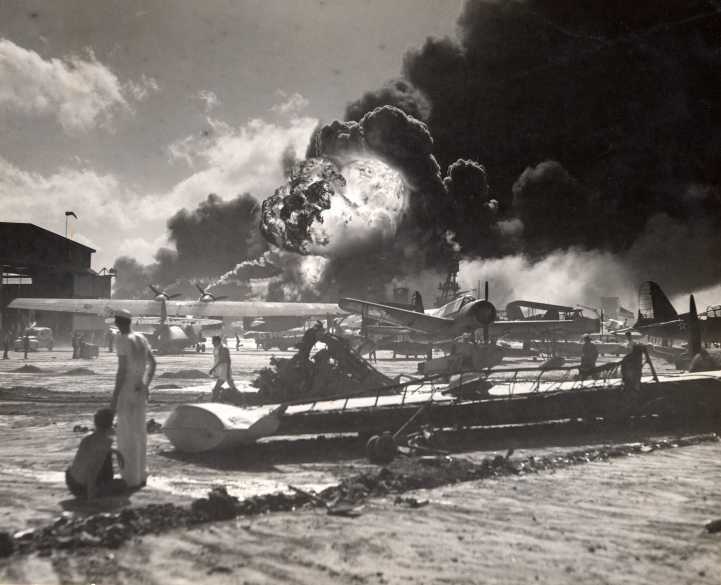
VERY RARE & Unusual WWII Photographs
Where have these pics been hiding for the past 65 years?
Japanese Kawanishi H8K seaplane after strafing. Kwajalein
Squad of Rufe’s at Bougainville . These things were very nimble even with the pontoons.
The A6M2-N float plane version of the Zero did extremely well, suffering only a small loss in its legendary maneuverability. Top speed was not affected, however, the aircraft’s relatively light armament was a detriment.
Snow on deck. USS Philippine Sea North Pacific 1945
HARVS on the way in shot by a P-47. Rare shot. Deck crew climbing up to get the pilot out. He did. That’s a fuel tank his foot is on. Empty? Marines disembark LST at Tinian Island.
Bougainville.
Guam
Outside Bastogne
German 280mm K5 firing U.S. munitions ship goes up during the invasion of Sicily. V1 Spitfire “tipping-off” a V1. If you’ve never heard of this insane tactic ……. At first V1’s were shot down by gunfire. Optimum range was inside 200yds, which was marginal for survival. Many planes were damaged and quite a few pilots killed. Basically at such high speed and low altitude a plane had to fly though the explosion and hope. With the high risk of being blown up some of the best pilots started tipping the V1’s wing, because of damage to wing tips they later developed a tactic of disrupting the aitflow by placing their wing very close to the V1’s wing, causing it to topple.
Not every pilot did this. At night this was not possible, the flame from the V1 blinded the pilot to everything else, though some Mossie pilots flew past closely in front of the V1, again causing it to topple. The thought of doing this at 450mph, 4,000 feet above the ground, at night and being blinded gives me the willies. Panzerkampfwagen VI “E Tiger” Ju 88 loading a torpedo. This is one HUGE bomber … and it’s on pontoons!!!! German “KARL” mortars. Sebastopol Reloading a KARL BOOM! Macchi 202v
Italian 303 Bombers over N Africa
See more pictures below!!
PICTURES TAKEN 69 YRS AGO & LEFT IN A BROWNIE ARE REAL INTERESTING.
====================================================
(December 7, 1941)
Isn’t it amazing how a film could last so long in a camera without disintegrating?
Fantastic photos taken 69 years ago. Some of you will have to go to a museum to
see what a Brownie box camera looked like?
Here is a simple picture of what we are talking about. . .
These photos are absolutely incredible…..Read below, the first picture and at the end…
PHOTOS STORED IN AN OLD BROWNIE CAMERA
Thought you might find these photos very interesting; what quality from 1941. These Pearl Harbor photos
were found in an old Brownie stored in a foot locker and just recently taken to be developed. They are from
a Sailor who was on the USS Quapaw ATF-110.
PEARL HARBOR
December 7th, 1941
-

Armenians Must Counter UN Security Council Bids by Turkey and Azerbaijan
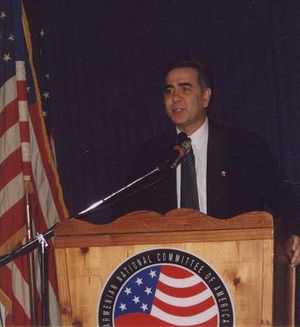 Diasporan political organizations and influential Armenians, in cooperation with the Armenian Foreign Ministry, should launch an international lobbying campaign to block Turkey and Azerbaijan from gaining coveted seats on the United Nations Security Council.Three years ago, I made a similar plea when Turkey was seeking a seat on the Security Council for the first time since 1961. I urged Armenians worldwide to contact government leaders of their respective countries, requesting that their UN representatives oppose Turkey’s Security Council bid. Regrettably, no such efforts were made and Turkey easily gained a seat on the powerful Security Council for a two-year term (2009 & 2010).One advantage Armenians have in being scattered throughout the world is their unique opportunity to lobby the governments of dozens of countries on upcoming issues at the UN. Such a strategy would considerably strengthen the Armenian Foreign Ministry’s UN activities. Diaspora’s political clout and contacts would counter the considerable financial resources Turkey and Azerbaijan provide to many countries to obtain their UN votes. As reported by the Eurasia Daily Monitor, Turkey bribed dozens of third world countries in its successful bid for a Security Council seat in 2009. The Turkish government went as far as contributing $20 million to a number of small nations to pay off their UN membership dues, so they won’t lose their voting rights!Encouraged by the results of its previous campaign, Turkey just announced its candidacy for yet another term on the Security Council in 2015-2016, competing with Spain and New Zealand for two open regional seats. Both of these countries are far more qualified than Turkey in terms of fulfilling Security Council’s objectives of contributing to international peace and security. Having just served for two years on the Security Council after the absence of a half-century, Turkey’s hegemonic appetite is now whetted to return to the Council in 5 years, much earlier than its turn!For those familiar with Turkey’s long record of human rights violations, repeated massacres of Kurds, denial of the Armenian Genocide, and occupation of the northern part of Cyprus, it is shocking to read the excuses of the Turkish Foreign Ministry for its new Security Council bid: “Turkey is determined to increase its contributions to international peace, security and prosperity, as well as to further its efforts towards strengthening fundamental principles and values such as human rights, democracy and rule of law.”Having a seat on the UN Security Council, however, may not always be advantageous for Turkey. Its hypocritical behavior of pretending to be everyone’s best friend risks being exposed, as was the case in 2009-2010 when Turkey was forced to take sides and vote on such thorny issues as the Arab-Israeli conflict and the controversial Iranian nuclear program, antagonizing many of its traditional allies.While Armenians have a five-year advance notice to effectively plan their lobbying activities against Turkey’s membership bid, they have only three months to obstruct Azerbaijan’s Security Council candidacy in elections to be held this October. According to knowledgeable sources, Azerbaijan’s Foreign Minister Elmar Mammadyarov is globe-trotting to provide financial inducements to dozens of needy countries in return for votes. Mammadyarov urged the Foreign Ministers gathered at the Organization of Islamic Cooperation conference to support Azerbaijan’s first-ever bid for a seat on the Security Council, claiming that his country has a “strong commitment to goals and principles of the UN Charter.”Given Azerbaijan’s authoritarian regime as documented by the State Department and other human rights organizations, in particular its lack of democracy, flagrant violations of human rights, and constant threats to use force against the neighboring Republics of Armenia and Nagorno-Karabagh (Artsakh), it is hard to imagine a country less qualified to serve on the UN Security Council.Since Azerbaijan will be competing with Slovenia and Hungary for a Security Council seat, one would think that Baku’s chances are close to zero. However, given Azerbaijan’s lavish vote-buying spree funded by abundant petrodollars, Armenians and their supporters need to work hard in the next three months to channel the UN members’ votes towards either Slovenia or Hungary, and away from Azerbaijan.In countering Turkish and Azerbaijani efforts in international organizations, Armenians must be encouraged by the major political setback suffered by Turkey last week, when Armenia and Cyprus blocked the appointment of a Turkish diplomat to the prestigious position of Secretary General of the Organization for Security and Cooperation in Europe (OSCE). The top contenders for that job were Austria’s former Foreign Minister, Ursula Plassnik and Turkey’s Ambassador to Brazil, Ersin Ercin. By blocking Austria’s candidate, Turkey caused a serious diplomatic rift between the two countries. At the end, Ambassador Lamberto Zannier of Italy was unanimously chosen as OSCE’s new Secretary General.Armenia and Cyprus must be congratulated for not caving in to Turkish pressures and standing up in defense of their national interests.
Diasporan political organizations and influential Armenians, in cooperation with the Armenian Foreign Ministry, should launch an international lobbying campaign to block Turkey and Azerbaijan from gaining coveted seats on the United Nations Security Council.Three years ago, I made a similar plea when Turkey was seeking a seat on the Security Council for the first time since 1961. I urged Armenians worldwide to contact government leaders of their respective countries, requesting that their UN representatives oppose Turkey’s Security Council bid. Regrettably, no such efforts were made and Turkey easily gained a seat on the powerful Security Council for a two-year term (2009 & 2010).One advantage Armenians have in being scattered throughout the world is their unique opportunity to lobby the governments of dozens of countries on upcoming issues at the UN. Such a strategy would considerably strengthen the Armenian Foreign Ministry’s UN activities. Diaspora’s political clout and contacts would counter the considerable financial resources Turkey and Azerbaijan provide to many countries to obtain their UN votes. As reported by the Eurasia Daily Monitor, Turkey bribed dozens of third world countries in its successful bid for a Security Council seat in 2009. The Turkish government went as far as contributing $20 million to a number of small nations to pay off their UN membership dues, so they won’t lose their voting rights!Encouraged by the results of its previous campaign, Turkey just announced its candidacy for yet another term on the Security Council in 2015-2016, competing with Spain and New Zealand for two open regional seats. Both of these countries are far more qualified than Turkey in terms of fulfilling Security Council’s objectives of contributing to international peace and security. Having just served for two years on the Security Council after the absence of a half-century, Turkey’s hegemonic appetite is now whetted to return to the Council in 5 years, much earlier than its turn!For those familiar with Turkey’s long record of human rights violations, repeated massacres of Kurds, denial of the Armenian Genocide, and occupation of the northern part of Cyprus, it is shocking to read the excuses of the Turkish Foreign Ministry for its new Security Council bid: “Turkey is determined to increase its contributions to international peace, security and prosperity, as well as to further its efforts towards strengthening fundamental principles and values such as human rights, democracy and rule of law.”Having a seat on the UN Security Council, however, may not always be advantageous for Turkey. Its hypocritical behavior of pretending to be everyone’s best friend risks being exposed, as was the case in 2009-2010 when Turkey was forced to take sides and vote on such thorny issues as the Arab-Israeli conflict and the controversial Iranian nuclear program, antagonizing many of its traditional allies.While Armenians have a five-year advance notice to effectively plan their lobbying activities against Turkey’s membership bid, they have only three months to obstruct Azerbaijan’s Security Council candidacy in elections to be held this October. According to knowledgeable sources, Azerbaijan’s Foreign Minister Elmar Mammadyarov is globe-trotting to provide financial inducements to dozens of needy countries in return for votes. Mammadyarov urged the Foreign Ministers gathered at the Organization of Islamic Cooperation conference to support Azerbaijan’s first-ever bid for a seat on the Security Council, claiming that his country has a “strong commitment to goals and principles of the UN Charter.”Given Azerbaijan’s authoritarian regime as documented by the State Department and other human rights organizations, in particular its lack of democracy, flagrant violations of human rights, and constant threats to use force against the neighboring Republics of Armenia and Nagorno-Karabagh (Artsakh), it is hard to imagine a country less qualified to serve on the UN Security Council.Since Azerbaijan will be competing with Slovenia and Hungary for a Security Council seat, one would think that Baku’s chances are close to zero. However, given Azerbaijan’s lavish vote-buying spree funded by abundant petrodollars, Armenians and their supporters need to work hard in the next three months to channel the UN members’ votes towards either Slovenia or Hungary, and away from Azerbaijan.In countering Turkish and Azerbaijani efforts in international organizations, Armenians must be encouraged by the major political setback suffered by Turkey last week, when Armenia and Cyprus blocked the appointment of a Turkish diplomat to the prestigious position of Secretary General of the Organization for Security and Cooperation in Europe (OSCE). The top contenders for that job were Austria’s former Foreign Minister, Ursula Plassnik and Turkey’s Ambassador to Brazil, Ersin Ercin. By blocking Austria’s candidate, Turkey caused a serious diplomatic rift between the two countries. At the end, Ambassador Lamberto Zannier of Italy was unanimously chosen as OSCE’s new Secretary General.Armenia and Cyprus must be congratulated for not caving in to Turkish pressures and standing up in defense of their national interests. -

Sassounian’s column of July 14, 2011
Prof. Akcam Reveals Turkish Plan to PayScholars to Deny the Armenian Genocide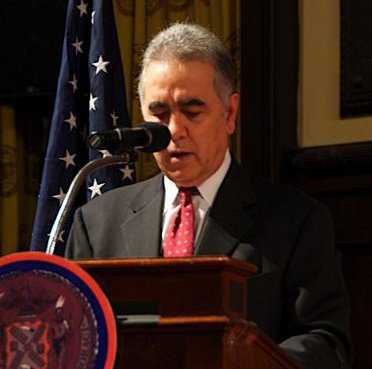 Prof. Taner Akcam dropped a bombshell during a lecture at the Glendale Public Library last month, when he revealed that a confidential source in Istanbul had informed him about the Turkish government’s scheme to bribe American scholars to deny the Armenian Genocide.Dr. Akcam, holder of the Kaloosdian/Mugar Chair in Armenian Genocide Studies at Clark University in Worcester, Mass., stated that “the Turkish government is following a very systematic and aggressive policy in the US,” by attempting to cast doubt on the veracity of the Armenian Genocide. Ankara’s grand scheme is to make Turkish denialist claims as widely acceptable as the belief that the events of 1915 constituted genocide. Moreover, through a series of lawsuits in US courts, Turkey and its proxies are trying to present any criticism of denialist scholars and exclusion of revisionist materials from university programs as suppression of “academic freedom.”Prof. Akcam, one of the first Turkish scholars to acknowledge the Armenian Genocide, related to his audience that during his visit to Istanbul last December, he had a private conversation with a person who had “inside information” regarding the Turkish Foreign Ministry’s activities in the United States on subject of the Armenian Genocide. Dr. Akcam’s confidential source told him that sometime in 2004-2005, an American university professor had met with “authorities connected with the Turkish Foreign Ministry.” At that meeting, the professor told his Turkish hosts that “Turkey didn’t have a systematic program on the academic level with which to counter the claims of an Armenian Genocide,” and that “the genocide claim is well established at this point,” telling them that “there’s very little” they can do “by trying to confront it head on.”Dr. Akcam was privately informed that the American professor made the following recommendation to Turkish officials: “The thing you need to do is to dig a ditch in front of all the genocide claims; you need to create doubt by writing scholarly works which will awaken that doubt.” Dr. Akcam interpreted these words to mean that “by producing and encouraging new academic works,” American scholars could “normalize the idea that 1915 was not genocide, just as the belief that it was genocide has become accepted.”While it is commonly assumed that the Turkish government provides financial incentives to scholars worldwide to publish articles and books denying the Armenian Genocide, this is the first time that a knowledgeable Turkish insider has confirmed these assumptions. The confidential source told Dr. Akcam that the Turkish Foreign Ministry accepted the American scholar’s proposal and “transferred large sums of money to the US.” The informant revealed to Dr. Akcam the names of American academics who received funds to write books denying the Armenian Genocide, and disclosed that “there are documents signed by their own hand and that these receipts are now in the files of the Foreign Ministry’s records.”In his lecture, Dr. Akcam stated that he did not want “to put any academic under a cloud of suspicion.” However, when he connected the information received from his Istanbul source to some recent publications, “a disturbing picture emerges as far as Armenian Genocide research is concerned.”Dr. Akcam then referred to Michael Gunter’s recent book, “Armenian History and the Question of Genocide,” as a possible “example of this approach.” The website of the book’s publisher, Palgrave Macmillan, stated: “Although as many as 600,000 of them [Armenians] died during World War I, it was neither a premeditated policy perpetrated by the Ottoman Turkish government nor an event unilaterally implemented without cause. Of course, in no way does this excuse the horrible excesses that were committed.”Prof. Akcam further observed that the four academics — Hakan Yavuz of University of Utah, Guenter Lewy of University of Massachusetts, Jeremy Salt of Bilkent University, Ankara, and Edward J. Ericson of Marine Corps Command & Staff College, Virginia — who praised Gunter’s book, “are well known for their denialist position and works regarding the genocide of 1915.” Although Prof. Akcam did not wish to make “an accusation against the book’s writer,” he stated: “the strange similarities between what I was told in confidence in Istanbul and what appears on the jacket cover of that book gave me pause, that’s all.”While no one should accuse academics of receiving funds from the Turkish government or its proxies without solid evidence, it would be enlightening if any of them would voluntarily come forward and disclose whether they have been funded by Turkish sources!
Prof. Taner Akcam dropped a bombshell during a lecture at the Glendale Public Library last month, when he revealed that a confidential source in Istanbul had informed him about the Turkish government’s scheme to bribe American scholars to deny the Armenian Genocide.Dr. Akcam, holder of the Kaloosdian/Mugar Chair in Armenian Genocide Studies at Clark University in Worcester, Mass., stated that “the Turkish government is following a very systematic and aggressive policy in the US,” by attempting to cast doubt on the veracity of the Armenian Genocide. Ankara’s grand scheme is to make Turkish denialist claims as widely acceptable as the belief that the events of 1915 constituted genocide. Moreover, through a series of lawsuits in US courts, Turkey and its proxies are trying to present any criticism of denialist scholars and exclusion of revisionist materials from university programs as suppression of “academic freedom.”Prof. Akcam, one of the first Turkish scholars to acknowledge the Armenian Genocide, related to his audience that during his visit to Istanbul last December, he had a private conversation with a person who had “inside information” regarding the Turkish Foreign Ministry’s activities in the United States on subject of the Armenian Genocide. Dr. Akcam’s confidential source told him that sometime in 2004-2005, an American university professor had met with “authorities connected with the Turkish Foreign Ministry.” At that meeting, the professor told his Turkish hosts that “Turkey didn’t have a systematic program on the academic level with which to counter the claims of an Armenian Genocide,” and that “the genocide claim is well established at this point,” telling them that “there’s very little” they can do “by trying to confront it head on.”Dr. Akcam was privately informed that the American professor made the following recommendation to Turkish officials: “The thing you need to do is to dig a ditch in front of all the genocide claims; you need to create doubt by writing scholarly works which will awaken that doubt.” Dr. Akcam interpreted these words to mean that “by producing and encouraging new academic works,” American scholars could “normalize the idea that 1915 was not genocide, just as the belief that it was genocide has become accepted.”While it is commonly assumed that the Turkish government provides financial incentives to scholars worldwide to publish articles and books denying the Armenian Genocide, this is the first time that a knowledgeable Turkish insider has confirmed these assumptions. The confidential source told Dr. Akcam that the Turkish Foreign Ministry accepted the American scholar’s proposal and “transferred large sums of money to the US.” The informant revealed to Dr. Akcam the names of American academics who received funds to write books denying the Armenian Genocide, and disclosed that “there are documents signed by their own hand and that these receipts are now in the files of the Foreign Ministry’s records.”In his lecture, Dr. Akcam stated that he did not want “to put any academic under a cloud of suspicion.” However, when he connected the information received from his Istanbul source to some recent publications, “a disturbing picture emerges as far as Armenian Genocide research is concerned.”Dr. Akcam then referred to Michael Gunter’s recent book, “Armenian History and the Question of Genocide,” as a possible “example of this approach.” The website of the book’s publisher, Palgrave Macmillan, stated: “Although as many as 600,000 of them [Armenians] died during World War I, it was neither a premeditated policy perpetrated by the Ottoman Turkish government nor an event unilaterally implemented without cause. Of course, in no way does this excuse the horrible excesses that were committed.”Prof. Akcam further observed that the four academics — Hakan Yavuz of University of Utah, Guenter Lewy of University of Massachusetts, Jeremy Salt of Bilkent University, Ankara, and Edward J. Ericson of Marine Corps Command & Staff College, Virginia — who praised Gunter’s book, “are well known for their denialist position and works regarding the genocide of 1915.” Although Prof. Akcam did not wish to make “an accusation against the book’s writer,” he stated: “the strange similarities between what I was told in confidence in Istanbul and what appears on the jacket cover of that book gave me pause, that’s all.”While no one should accuse academics of receiving funds from the Turkish government or its proxies without solid evidence, it would be enlightening if any of them would voluntarily come forward and disclose whether they have been funded by Turkish sources! -

Armenians Must Counter UN Security Council Bids by Turkey and Azerbaijan
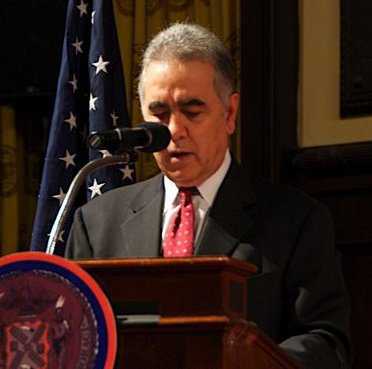 Diasporan political organizations and influential Armenians, in cooperation with the Armenian Foreign Ministry, should launch an international lobbying campaign to block Turkey and Azerbaijan from gaining coveted seats on the United Nations Security Council.Three years ago, I made a similar plea when Turkey was seeking a seat on the Security Council for the first time since 1961. I urged Armenians worldwide to contact government leaders of their respective countries, requesting that their UN representatives oppose Turkey’s Security Council bid. Regrettably, no such efforts were made and Turkey easily gained a seat on the powerful Security Council for a two-year term (2009 & 2010).One advantage Armenians have in being scattered throughout the world is their unique opportunity to lobby the governments of dozens of countries on upcoming issues at the UN. Such a strategy would considerably strengthen the Armenian Foreign Ministry’s UN activities. Diaspora’s political clout and contacts would counter the considerable financial resources Turkey and Azerbaijan provide to many countries to obtain their UN votes. As reported by the Eurasia Daily Monitor, Turkey bribed dozens of third world countries in its successful bid for a Security Council seat in 2009. The Turkish government went as far as contributing $20 million to a number of small nations to pay off their UN membership dues, so they won’t lose their voting rights!Encouraged by the results of its previous campaign, Turkey just announced its candidacy for yet another term on the Security Council in 2015-2016, competing with Spain and New Zealand for two open regional seats. Both of these countries are far more qualified than Turkey in terms of fulfilling Security Council’s objectives of contributing to international peace and security. Having just served for two years on the Security Council after the absence of a half-century, Turkey’s hegemonic appetite is now whetted to return to the Council in 5 years, much earlier than its turn!For those familiar with Turkey’s long record of human rights violations, repeated massacres of Kurds, denial of the Armenian Genocide, and occupation of the northern part of Cyprus, it is shocking to read the excuses of the Turkish Foreign Ministry for its new Security Council bid: “Turkey is determined to increase its contributions to international peace, security and prosperity, as well as to further its efforts towards strengthening fundamental principles and values such as human rights, democracy and rule of law.”Having a seat on the UN Security Council, however, may not always be advantageous for Turkey. Its hypocritical behavior of pretending to be everyone’s best friend risks being exposed, as was the case in 2009-2010 when Turkey was forced to take sides and vote on such thorny issues as the Arab-Israeli conflict and the controversial Iranian nuclear program, antagonizing many of its traditional allies.While Armenians have a five-year advance notice to effectively plan their lobbying activities against Turkey’s membership bid, they have only three months to obstruct Azerbaijan’s Security Council candidacy in elections to be held this October. According to knowledgeable sources, Azerbaijan’s Foreign Minister Elmar Mammadyarov is globe-trotting to provide financial inducements to dozens of needy countries in return for votes. Mammadyarov urged the Foreign Ministers gathered at the Organization of Islamic Cooperation conference to support Azerbaijan’s first-ever bid for a seat on the Security Council, claiming that his country has a “strong commitment to goals and principles of the UN Charter.”Given Azerbaijan’s authoritarian regime as documented by the State Department and other human rights organizations, in particular its lack of democracy, flagrant violations of human rights, and constant threats to use force against the neighboring Republics of Armenia and Nagorno-Karabagh (Artsakh), it is hard to imagine a country less qualified to serve on the UN Security Council.Since Azerbaijan will be competing with Slovenia and Hungary for a Security Council seat, one would think that Baku’s chances are close to zero. However, given Azerbaijan’s lavish vote-buying spree funded by abundant petrodollars, Armenians and their supporters need to work hard in the next three months to channel the UN members’ votes towards either Slovenia or Hungary, and away from Azerbaijan.In countering Turkish and Azerbaijani efforts in international organizations, Armenians must be encouraged by the major political setback suffered by Turkey last week, when Armenia and Cyprus blocked the appointment of a Turkish diplomat to the prestigious position of Secretary General of the Organization for Security and Cooperation in Europe (OSCE). The top contenders for that job were Austria’s former Foreign Minister, Ursula Plassnik and Turkey’s Ambassador to Brazil, Ersin Ercin. By blocking Austria’s candidate, Turkey caused a serious diplomatic rift between the two countries. At the end, Ambassador Lamberto Zannier of Italy was unanimously chosen as OSCE’s new Secretary General.Armenia and Cyprus must be congratulated for not caving in to Turkish pressures and standing up in defense of their national interests.
Diasporan political organizations and influential Armenians, in cooperation with the Armenian Foreign Ministry, should launch an international lobbying campaign to block Turkey and Azerbaijan from gaining coveted seats on the United Nations Security Council.Three years ago, I made a similar plea when Turkey was seeking a seat on the Security Council for the first time since 1961. I urged Armenians worldwide to contact government leaders of their respective countries, requesting that their UN representatives oppose Turkey’s Security Council bid. Regrettably, no such efforts were made and Turkey easily gained a seat on the powerful Security Council for a two-year term (2009 & 2010).One advantage Armenians have in being scattered throughout the world is their unique opportunity to lobby the governments of dozens of countries on upcoming issues at the UN. Such a strategy would considerably strengthen the Armenian Foreign Ministry’s UN activities. Diaspora’s political clout and contacts would counter the considerable financial resources Turkey and Azerbaijan provide to many countries to obtain their UN votes. As reported by the Eurasia Daily Monitor, Turkey bribed dozens of third world countries in its successful bid for a Security Council seat in 2009. The Turkish government went as far as contributing $20 million to a number of small nations to pay off their UN membership dues, so they won’t lose their voting rights!Encouraged by the results of its previous campaign, Turkey just announced its candidacy for yet another term on the Security Council in 2015-2016, competing with Spain and New Zealand for two open regional seats. Both of these countries are far more qualified than Turkey in terms of fulfilling Security Council’s objectives of contributing to international peace and security. Having just served for two years on the Security Council after the absence of a half-century, Turkey’s hegemonic appetite is now whetted to return to the Council in 5 years, much earlier than its turn!For those familiar with Turkey’s long record of human rights violations, repeated massacres of Kurds, denial of the Armenian Genocide, and occupation of the northern part of Cyprus, it is shocking to read the excuses of the Turkish Foreign Ministry for its new Security Council bid: “Turkey is determined to increase its contributions to international peace, security and prosperity, as well as to further its efforts towards strengthening fundamental principles and values such as human rights, democracy and rule of law.”Having a seat on the UN Security Council, however, may not always be advantageous for Turkey. Its hypocritical behavior of pretending to be everyone’s best friend risks being exposed, as was the case in 2009-2010 when Turkey was forced to take sides and vote on such thorny issues as the Arab-Israeli conflict and the controversial Iranian nuclear program, antagonizing many of its traditional allies.While Armenians have a five-year advance notice to effectively plan their lobbying activities against Turkey’s membership bid, they have only three months to obstruct Azerbaijan’s Security Council candidacy in elections to be held this October. According to knowledgeable sources, Azerbaijan’s Foreign Minister Elmar Mammadyarov is globe-trotting to provide financial inducements to dozens of needy countries in return for votes. Mammadyarov urged the Foreign Ministers gathered at the Organization of Islamic Cooperation conference to support Azerbaijan’s first-ever bid for a seat on the Security Council, claiming that his country has a “strong commitment to goals and principles of the UN Charter.”Given Azerbaijan’s authoritarian regime as documented by the State Department and other human rights organizations, in particular its lack of democracy, flagrant violations of human rights, and constant threats to use force against the neighboring Republics of Armenia and Nagorno-Karabagh (Artsakh), it is hard to imagine a country less qualified to serve on the UN Security Council.Since Azerbaijan will be competing with Slovenia and Hungary for a Security Council seat, one would think that Baku’s chances are close to zero. However, given Azerbaijan’s lavish vote-buying spree funded by abundant petrodollars, Armenians and their supporters need to work hard in the next three months to channel the UN members’ votes towards either Slovenia or Hungary, and away from Azerbaijan.In countering Turkish and Azerbaijani efforts in international organizations, Armenians must be encouraged by the major political setback suffered by Turkey last week, when Armenia and Cyprus blocked the appointment of a Turkish diplomat to the prestigious position of Secretary General of the Organization for Security and Cooperation in Europe (OSCE). The top contenders for that job were Austria’s former Foreign Minister, Ursula Plassnik and Turkey’s Ambassador to Brazil, Ersin Ercin. By blocking Austria’s candidate, Turkey caused a serious diplomatic rift between the two countries. At the end, Ambassador Lamberto Zannier of Italy was unanimously chosen as OSCE’s new Secretary General.Armenia and Cyprus must be congratulated for not caving in to Turkish pressures and standing up in defense of their national interests.






